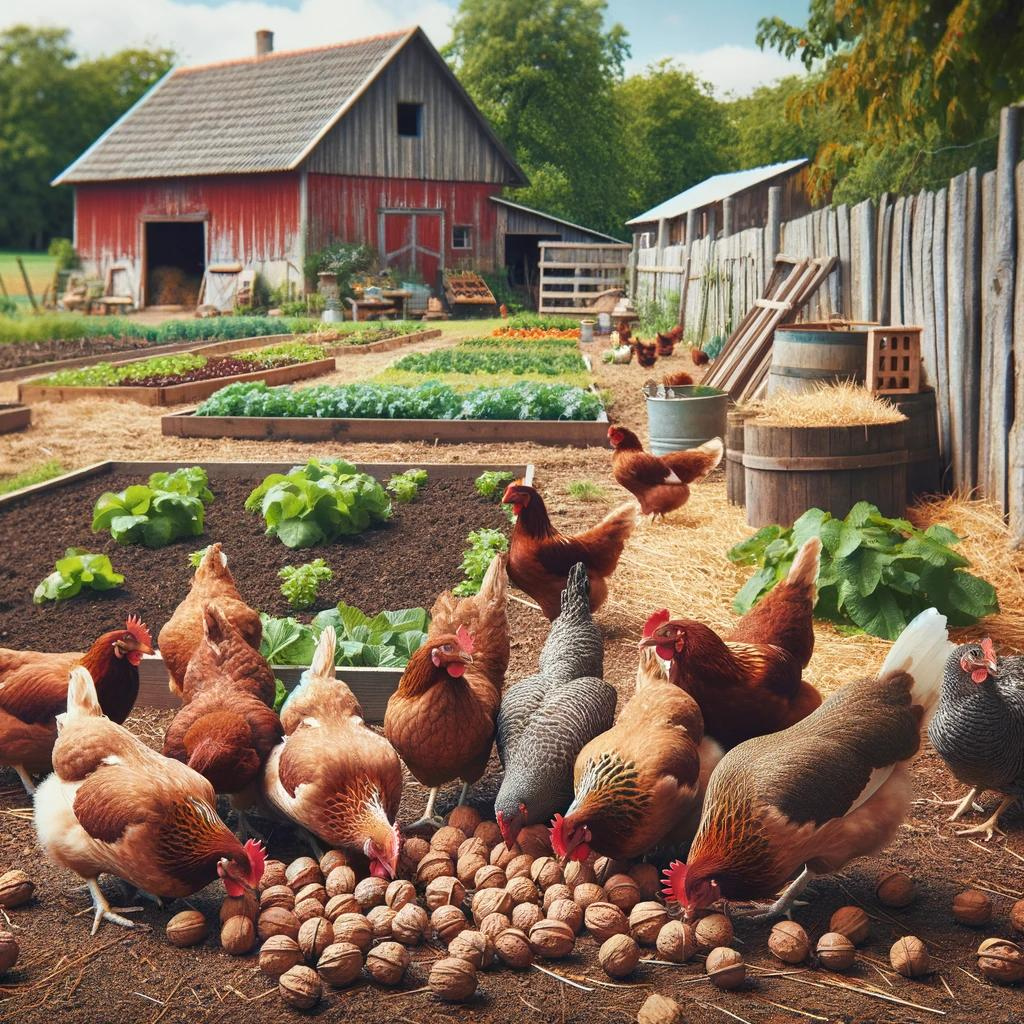
Yes, chickens can eat walnuts in moderation. Walnuts are a good source of protein and healthy fats for chickens, but they should be given in small amounts and preferably crushed or chopped to make them easier to eat.
Are Walnuts Safe for Chickens to Consume?
Yes, walnuts are safe for chickens to consume in moderation. They provide a good source of protein and healthy fats for chickens. However, it’s essential to offer them in small amounts and ensure they are not rancid or moldy.
Can Chickens Eat Whole Walnuts or Should They Be Shelled?
Chickens can eat whole walnuts, but it’s better to shell them or crush them to make it easier for the chickens to consume.
Should Walnuts Be Given to Chickens Raw or Cooked?
Walnuts should be given to chickens raw, as cooking can alter their nutritional content and may make them less suitable for chickens.
Can Chickens Eat Walnuts as a Regular Part of Their Diet?
While chickens can eat walnuts as an occasional treat, they shouldn’t be a regular part of their diet. Walnuts should be offered in moderation alongside their main diet of grains, vegetables, and other poultry feed.
Are There Any Health Benefits for Chickens from Eating Walnuts?
Yes, walnuts can provide health benefits for chickens. They are a good source of protein, healthy fats, vitamins, and minerals, which can contribute to overall chicken health and well-being when consumed in moderation.
Can Walnuts Help with Chickens’ Feather Health?
Yes, walnuts contain essential fatty acids and nutrients that can contribute to healthy feather growth and maintenance in chickens when incorporated into their diet in moderation.
What Is the Recommended Serving Size of Walnuts for Chickens?
The recommended serving size of walnuts for chickens is small, typically a few pieces per bird, given as an occasional treat. It’s essential to monitor their intake and not to exceed recommended amounts to avoid unbalancing their diet.
Can Baby Chicks Safely Eat Walnuts?
Baby chicks should not eat walnuts as they may have difficulty digesting them. It’s best to wait until they are older and their digestive systems are more developed before introducing walnuts or any other hard foods.
Can Chickens Eat Walnuts with Other Foods or Treats?
Chickens can eat walnuts alongside other foods or treats, but it’s essential to ensure a balanced diet overall. Mixing walnuts with other healthy treats like fruits, vegetables, or grains can provide variety and nutrition for chickens.
Are There Any Risks Associated with Feeding Walnuts to Chickens?
One potential risk of feeding walnuts to chickens is overconsumption, which can lead to digestive issues due to their high-fat content. Additionally, moldy or rancid walnuts can be harmful to chickens, so it’s crucial to provide fresh nuts and monitor their intake.
Can Chickens Eat Black Walnuts, English Walnuts, and Other Varieties?
Chickens can eat various types of walnuts, including black walnuts and English walnuts, but it’s essential to ensure they are fresh and not moldy or rancid. All varieties should be given in moderation as part of a balanced diet for chickens.
How Should Walnuts Be Prepared Before Feeding Them to Chickens?
Before feeding walnuts to chickens, they should be cracked open or crushed to make them easier for the chickens to eat. Additionally, ensure that the walnuts are fresh, free from mold, and not rancid.
Can Chickens Eat Walnuts in the Shell?
Chickens can eat walnuts in the shell, but it’s better to crack them open or crush them to make it easier for the chickens to consume. Eating walnuts in the shell may pose a choking hazard or be difficult for chickens to digest.
What Should I Do If My Chickens Overindulge in Walnuts?
If your chickens overindulge in walnuts, monitor them closely for any signs of digestive upset such as diarrhea or lethargy. Limit their access to additional treats and ensure they have plenty of fresh water. If symptoms persist or worsen, consult with a veterinarian for further guidance.
*Always speak with your veterinarian before adding a new food to your chicken’s diet.